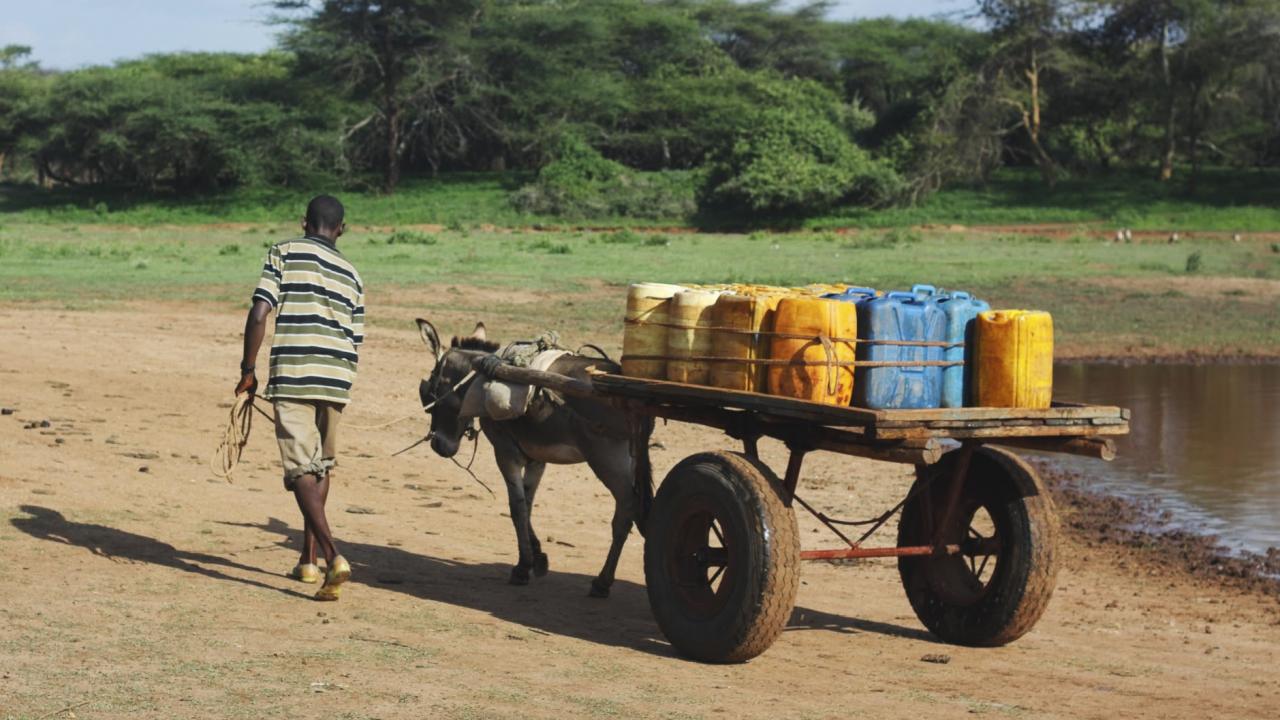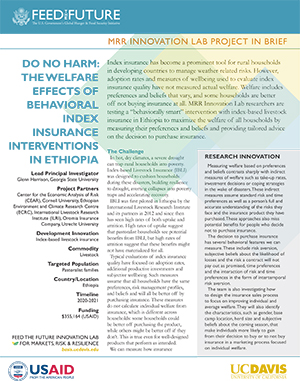
Index insurance has become a prominent tool for rural households in developing countries to manage weather-related risks. However, adoption rates and measures of wellbeing used to evaluate index insurance quality have not measured actual welfare. Welfare includes preferences and beliefs that vary, and some households are better off not buying insurance at all.
MRR Innovation Lab researchers are testing a “behaviorally smart” intervention with index-based livestock insurance in Ethiopia to maximize the welfare of all households by measuring their preferences and beliefs and providing tailored advice on the decision to purchase insurance.
Project overview
Lead Principal Investigator: Glenn Harrison, Georgia State University
Project Partners: Center for the Economic Analysis of Risk (CEAR), Cornell University, Ethiopian Environment and Climate Research Centre (ECRC), International Livestock Research Institute (ILRI), Oromia Insurance Company, Utrecht University
Development Innovation: Index-based livestock insurance
Commodity: Livestock
Targeted Population: Pastoralist families
Country/Location: Ethiopia
Timeline: 2020-2023
Funding: $355,164 (USAID)
The Challenge
In hot, dry climates, a severe drought can trap rural households into poverty. Index-based Livestock Insurance (IBLI) was designed to cushion households during these disasters, building resilience to drought, averting collapses into poverty traps and accelerating recovery.
IBLI was first piloted in Ethiopia by the International Livestock Research Institute and its partners in 2012 and since then has seen high rates of both uptake and attrition. High rates of uptake suggest that pastoralist households see potential benefits from IBLI, but high rates of attrition suggest that these benefits might not have materialized for all.
Evaluations of index insurance quality have often focused on adoption rates, additional productive investments and subjective wellbeing. Such measures assume that all households have the same preferences, risk management profiles, and beliefs and will all be better off by purchasing insurance. These measures do not calculate individual welfare from insurance, which is different across households: some households could be better off purchasing the product, while others might be better off if they don’t. This is true even for well-designed products that perform as intended.
We can measure how insurance affects welfare by measuring individual preferences and beliefs. Every household is unique in their attitudes to risk, their sensitivity to the likelihood of losses and how comfortable they are with paying insurance premiums now for potential benefits in the future. These preferences and beliefs are not indirect or incidental: they are fundamental to whether insurance improves or reduces welfare.
Research Design
MRR Innovation Lab researchers are conducting a “behaviorally smart” conditional IBLI intervention in the Borana Zone of Ethiopia that takes into account the preferences and beliefs that drive whether pastoralist households purchase index insurance. Rather than provide a nudge to buy through a one-size-fits-all intervention, behavioral interventions can be tailored to the specific circumstances, beliefs and attitudes to risk and time of a specific household, making it possible for them to maximize their welfare by deciding to purchase or not purchase insurance.
The project consists of two phases. The first phase is a baseline survey to measure a household’s preferences and beliefs with tasks in which they make decisions between different risky lotteries. These include deciding amounts of money they can receive now or later, anticipating future losses or an insurance policy’s failure to pay and evaluating different insurance products. They will make these decisions with real money given prior to the tasks as an endowment. The research team has already piloted these tasks with households in Borana in May 2019.
In the second phase, a lottery will determine if households are assigned to one of three interventions:
- Control group: IBLI sales agents provide basic information about the product with their usual incentives for selling policies.
- Treatment 1: In addition to basic information about IBLI, sales agents provide tailored advice based on a household’s preferences and beliefs from the baseline survey. Some households may be recommended not to buy any insurance.
- Treatment 2: Sales agents provide tailored advice but are compensated by how closely a household’s purchase decision matches the research team’s recommendation intended to maximize welfare.
The lottery guarantees the interventions consist of households who are comparable, including in terms of their preferences and beliefs. This ensures that differences in average welfare are caused by the interventions.
The project will utilize the infrastructure of an existing IBLI product that is sold by the Oromia Insurance Company (OIC). The Ethiopian Environment and Climate Research Centre (ECRC) will lead data collection at baseline and endline.

Development Impact
The impacts insurance has on household welfare can vary significantly, and there are households who will benefit most by choosing not to buy insurance. These tailored behavioral interventions are likely to generate large welfare gains for some, but also no significant welfare losses for others. The research team will also identify sub-populations that consistently lose in welfare—these families will benefit most from behaviorally smart conditional insurance interventions.
This project will provide guidance to policy makers about how to evaluate insurance’s contribution to welfare based on households’ preferences and beliefs. The project will also provide insights about how insurance companies can modify their approach to focus on enhancing welfare, which is especially important for creating a stable customer base in the long run.
